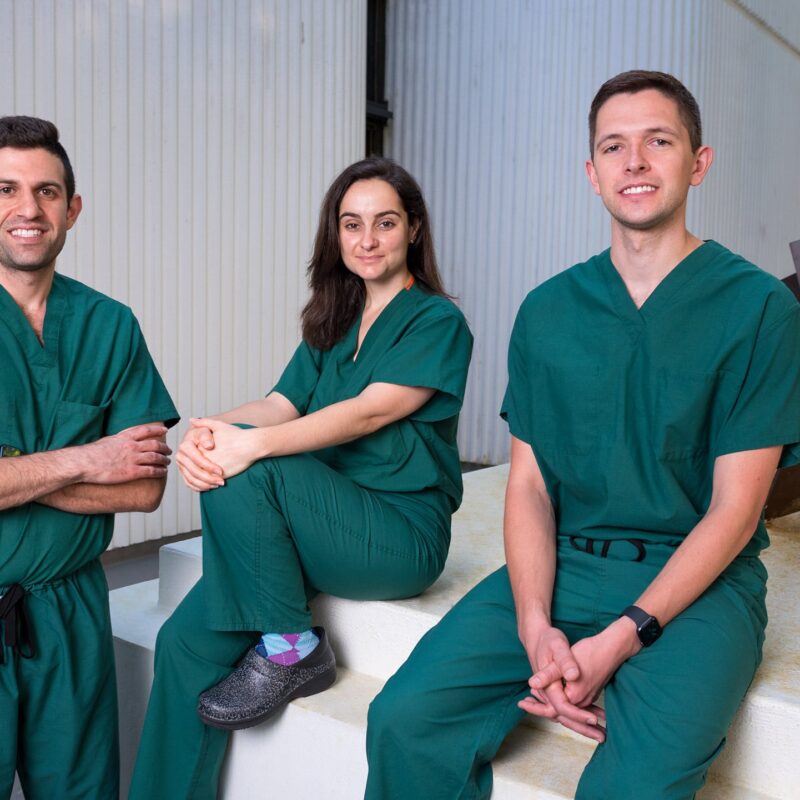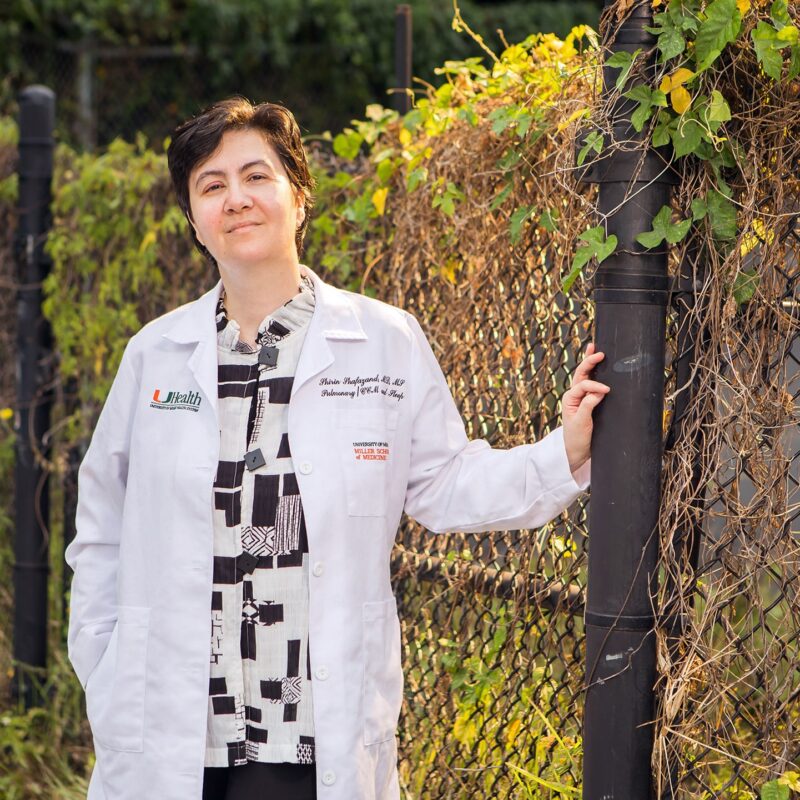Education
Voices
Michelle R. Caunca, Ph.D.
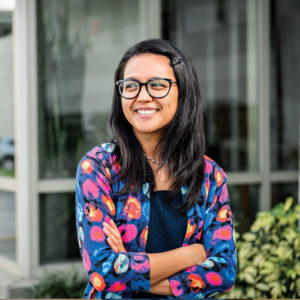 Michelle R. Caunca, Ph.D.
Michelle R. Caunca, Ph.D.
6th-year M.D./Ph.D. candidate
“I received my Ph.D. in epidemiology in 2019 and am now -doing the clinical part of my M.D., which I will complete in spring 2021. I am interested in how cerebrovascular disease, particularly among stroke -patients, contributes to Alzheimer’s disease, dementia and other cognitive disorders. I don’t necessarily want to -reverse aging, though I understand that perspective, but want to make sure people can age with the best quality of life possible, while also improving the lives of their caregivers. Ultimately, I would like to be an academic physician with my own lab where I can translate research into clinical practice and public health policy.As an M.D./Ph.D., the name of the game is translation.”
By Bob Woods
Photograph by Donna Victor
Preparing the Next Generation of Physicians
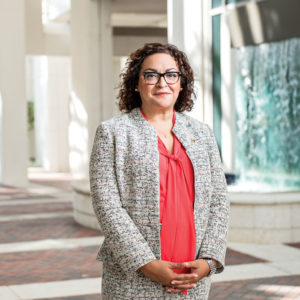 Nanette Vega, executive director of programs for the Office of Diversity, Inclusion and Community Engagement, describes the four programs that are part of the Future Medical Scholars Fellowship Program
Nanette Vega, executive director of programs for the Office of Diversity, Inclusion and Community Engagement, describes the four programs that are part of the Future Medical Scholars Fellowship Program
What is the mission of your programs?
We strive to create an inclusive environment and develop the next generation of underrepresented health care workers. We are especially committed to the four summer programs we conduct for high school and college students from economically and educationally underserved backgrounds. These seven-week training programs are a pathway to college and, in particular, medical school.
What programs will be offered?
Two intense residential programs for undergraduate students will be offered this summer. The Minority Students in Health Careers Motivation Program is a mini first-semester medical school experience during which undergraduate science and premed students develop skills to become competitive applicants for medical school. It includes abbreviated medical school classes, mock application interviews and clinical shadowing opportunities. In addition, the Summer Training in Research Program, with a heavy focus on methodology, helps premed undergraduates develop skills to investigate a wide range of medical issues, including those that greatly affect the health of traditionally underserved groups.
For premed undergraduates focused on taking the MCAT, we offer the Medical College Admission Test Preparation Program. The seven-week program includes test-taking tips and strategies, practice tests, medical school application workshops and weekly clinical shadowing opportunities.
We also conduct the High School Careers in Medicine Workshop, which promotes interest in health sciences among rising seniors from Miami-Dade County public schools. They take premed science courses and receive guidance in applying to college, one-on-one academic advice, and SAT skill-building and test-taking strategies.
By Bob Woods
Photograph by Donna Victor
A High-Altitude View of Health Care
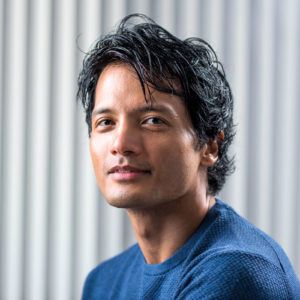 Stal Shrestha, Ph.D., wants to explore the inner workings of the brain while also focusing outward on global health
Stal Shrestha, Ph.D., wants to explore the inner workings of the brain while also focusing outward on global health
You are in your second year at the Miller School of Medicine, after earning a Ph.D. in clinical neuroscience, yet with all that going on you traveled to Nepal. Where are you headed long term?
While my interest lies in academic research in neuroscience, I developed a passion for global health as a Ph.D. trainee at the National Institutes of Health. Last summer, I spent seven weeks assessing the state of health care in rural and urban Nepal. This experience helped me cement my overall career goal, which is to improve diagnosis and treatment in the field of brain health. I hope to make a lasting, transgenerational impact —especially in countries where people are still dying of preventable diseases. Every human being has the right to adequate health care.
You also have gained an appreciation for health technology and its global potential. What do you have in mind?
People all over the world are living with end-stage illnesses such as heart disease, lung cancer and kidney failure. Advances in telemedicine, videoconferencing, health-tracking devices and other technologies can help providers care for them, especially in remote areas. At the same time, we need a collaborative effort across professions ranging from health care to politics to promote healthy lifestyles, preventive care and early interventions to avoid chronic illnesses.
Currently, your medical education centers on the brain. How does that fit into your career aspirations?
Eventually I would like to conduct global health research focused on neuroinflammation, which encompasses both mental health and neuro-degenerative conditions. During my Ph.D. training, I used multi-modality imaging techniques such as PET, MRI and CT to study the brain. I hope a research-track residency will allow me to begin developing novel biomarkers and therapeutics for early disease stages, including frugal innovations that will make these services affordable throughout the world. It is critical that we as a human civilization practice equality as a principle, rather than just as a concept. I feel that there is a void in global health. When I have traveled to other countries, it is heartbreaking to witness people receiving poor health care. So I want to see how I can best implement new strategic techniques and policies.
By Bob Woods
Photograph by Tom Salyer
Wellness Rotations Help Residents Avoid Burnout
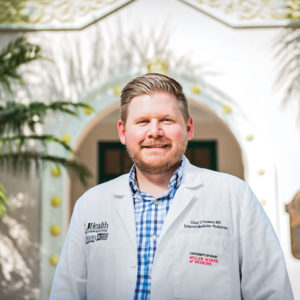 Chadwick Flowers, M.D., designed a program that allows internal -medicine residents to self-manage their stressful lives
Chadwick Flowers, M.D., designed a program that allows internal -medicine residents to self-manage their stressful lives
Six years ago, shortly after Dr. Chadwick Flowers began his internship at Jackson Memorial Hospital, a friend and fellow intern died by suicide. A year later, a cherished mentor took his own life. “Those experiences inspired me to look at physicians’ mental health and what residency programs are doing to address wellness,” Dr. Flowers said.
Today, in addition to his duties as an assistant professor of clinical medicine and a Med-Peds hospitalist at UHealth Tower, Dr. Flowers helps run the residency program in internal medicine. Last summer he introduced a novel, two-week wellness rotation for residents that deals head-on with depression, substance abuse and other strains that result in burnout —or worse. The rotation, scheduled into all three years of residency, “gives residents the opportunity to reflect on what wellness and burnout mean to them, and gives time to focus on those things,” Dr. Flowers said.
Residents initially complete a Professional Quality of Life Scale (ProQOL) survey, which evaluates various stressors in their lives, and arrange a confidential discussion with Heidi Allespach, Ph.D., a clinical psychologist in the department. During their non-clinical half days and/or full non-clinical days, they can elect to participate in a wide range of wellness pursuits, such as working out, mindfulness activities, or just watching Netflix. Residents are also encouraged to informally discuss burnout issues with each other and to plan a wrap-up event.
Dr. Flowers has received plenty of positive feedback from residents, saying that they appreciate the chance to face stress in a meaningful and realistic way. He realizes, though, that the problem requires the attention of the wider medical profession. “Unless we change things in a systemic way,” he said, “there’s not going to be an adequate solution.”
By Bob Woods
Photograph byDonna Victor




